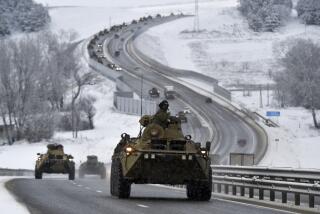Independents Safer for All If They Hang Together : Soviet Union: For the long term, the republics should seek fullest autonomy but retain a voice in a central body.
- Share via
In 1925 Germany had been through a great national humiliation at the Versailles Conference and the most terrible inflation after the war. But it had a well-functioning democracy and a very benign foreign policy. The economic shock produced by the 1929 depression transformed both its political system and its foreign policy.
As we analyze the Soviet Union today, we need to keep the 1920s firmly in mind. Boris Yeltsin has threatened that secession would lead to intervention by Russian troops to incorporate Russian-speaking areas in the Ukraine and Kazakhstan into the Russian federation. No doubt he also had in mind cities such as Narva and Kohtla-Jarve in Estonia, Klaipeda in Lithuania and virtually every city in Latvia (Riga in 1989 was 47% Russian and 36% Latvian). Maybe this threat was not meant seriously, but if bloody civil conflict breaks out between Russians and non-Russians in non-Russian republics--and it would--any Moscow government will be under enormous pressure to act.
But let us assume that this problem is solved. Let us assume that the European republics leave the Soviet Union. Let us assume that Russia remains, together with the six Muslim republics that will want to stay, at least at first. Let us assume that, temporarily at least, Russia stays democratic and has a benign foreign policy.
What will be the politics of the new Russia? The only patriotism and nationalism to which the Russian people can turn is pride in Russia itself, as Alexander Solzhenitsyn has been proposing. The attempt to open to the West will have been associated with national humiliation and loss of power. Millions of angry Russians will be returning from the non-Russian republics, looking for political leaders to support. The economy will be undergoing a depression like that of the 1930s.
What kind of program do you think would be attractive to Russian and Muslim voters in these circumstances? Don’t you have the slightest suspicion that anti-Westernism, anti-Semitism, anti-Israel/pro-Arab sentiments might have some appeal? What kind of foreign policy would such a Russia, with 200 million Russians and Muslims and the only nuclear weapons in the area, have toward its small neighbors? Would the United States intervene militarily, any more than we have in Yugoslavia? Would the American public support the risk of nuclear war with an emotional, fascist Russian leadership over these small territories?
Indeed, even the attitude of Poland toward Lithuania in the future is unclear. The Lithuanian capital, Vilnius, and surrounding territory were illegally taken from Poland in 1939 by the Hitler-Stalin Pact. Poles make up 10% of the Lithuanian population and a much higher percentage in the southern areas. As Polish economic difficulties continue, is there no danger of a military coup or a semi-fascist party arising, demanding territorial adjustments? What happens if there is ethnic strife between Poles and Lithuanians in Lithuania? Do you really think that Poland, with 38 million people, will not feel popular pressure to intervene vis-a-vis Lithuania, with 3.7 million people?
This revival of the nationalism of the 1930s seem so unnecessary. In broader historical perspective, the Europeans are coming together as they see China and India becoming the superpowers of the 21st Century. The 1,500-year schism between the Greek Orthodox and the Roman Catholic-Protestant branches of Christendom is coming to a close. Do we need yet another cataclysm among the Europeans to drive the point home?
The emotions between Orthodox Serbs and Catholic Croatians and Slovenians obviously still run high. The attitudes of the Catholic Poles and Lithuanians and the Protestant Latvians and Estonians toward the Orthodox Russians are shaped by many bitter memories. But at a time of great emotion, people should be encouraged to think of their long-term interests.
The Union Treaty in the Soviet Union was always a weird idea. Why should an already existing country not simply revise its constitution rather than act as if independent countries were coming together? But in the wake of a foolish coup, the declarations of independence do provide the occasion for symbolic acts and even more meaningful choice.
Some of the declarations of independence--those of the Ukraine, Byelorussia, Moldova and Armenia at a minimum--surely are primarily symbolic. The Baltic peoples will have a real choice. One hopes that even the Baltic peoples will give their long-term future the deepest thought and that they will look at the Swedish-speaking Aaland Islands of Finland. These islands have the fullest of autonomy: No Finnish troops can be stationed there, local youth cannot be drafted into the army, Finnish-speaking people cannot buy land on the islands. Yet, the Aaland Islands have a vote in the Finnish Parliament.
The Baltic peoples are the most westernized in the Soviet Union. I for one hope that they will continue to have three votes on a Soviet Council of Federation with 15 union republics, six of them Muslim. The Baltic people would be safer with such a vote in the leading organs of the neighboring superpower and their real autonomy would be as great as or greater than it would be within the European Community.
A Russian nationalism that must accommodate itself to other peoples in a multiethnic state in a democratic way is much safer, much more benign than a Russian nationalism based on bitterness, defeat and isolation. We could not judge the German future on the basis of a snapshot of 1925. We should not play chess one move at a time when we look at the Russia of 1991.
More to Read
Sign up for Essential California
The most important California stories and recommendations in your inbox every morning.
You may occasionally receive promotional content from the Los Angeles Times.













